Overseas participants in the Synodal Bible-Theological Commission conference highlight various aspects of primacy and conciliarity in Orthodoxy
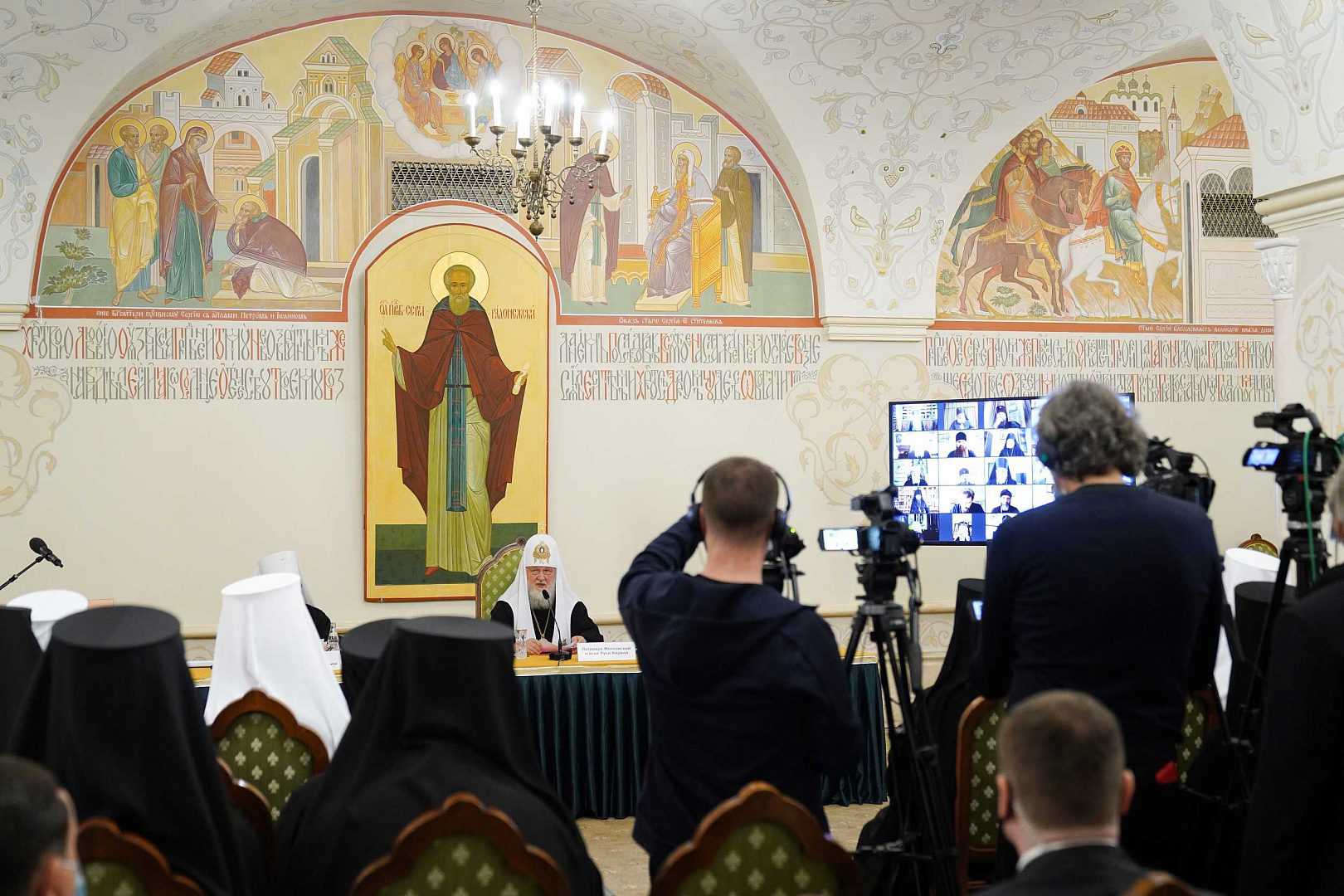
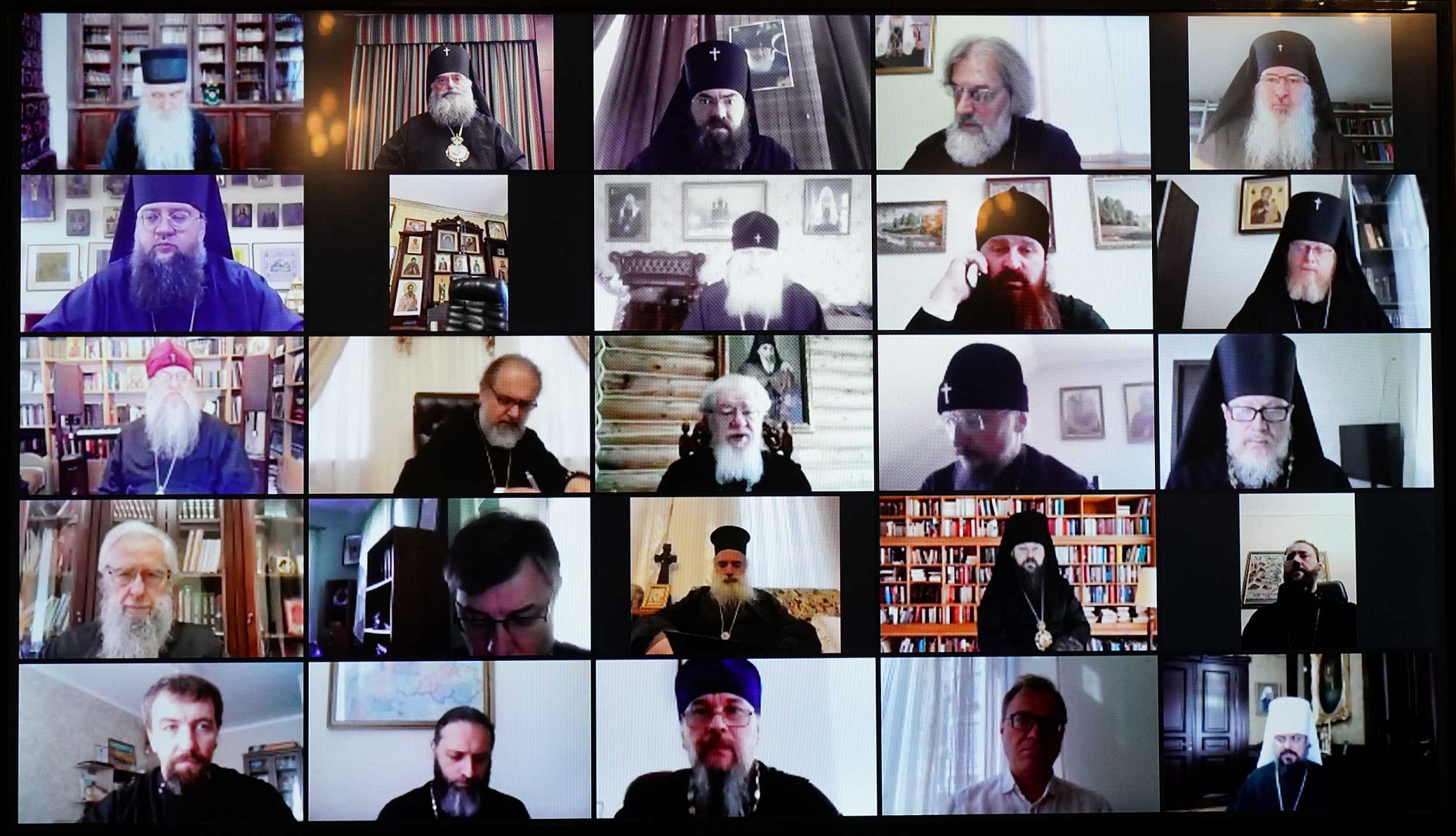

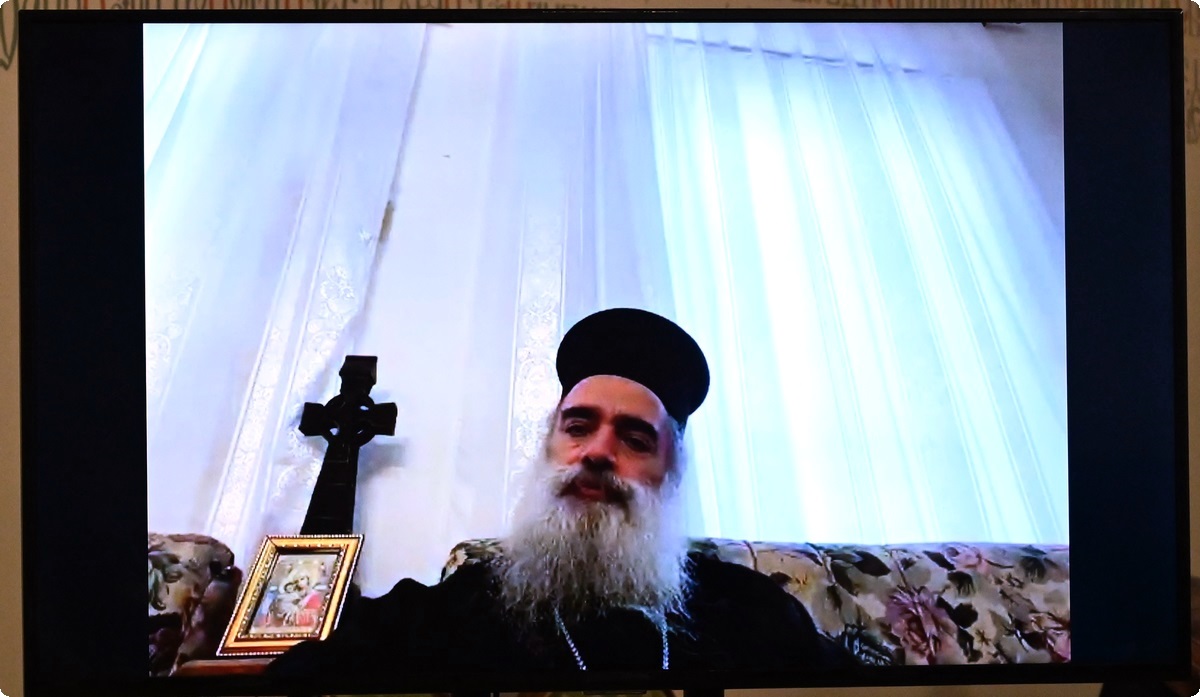
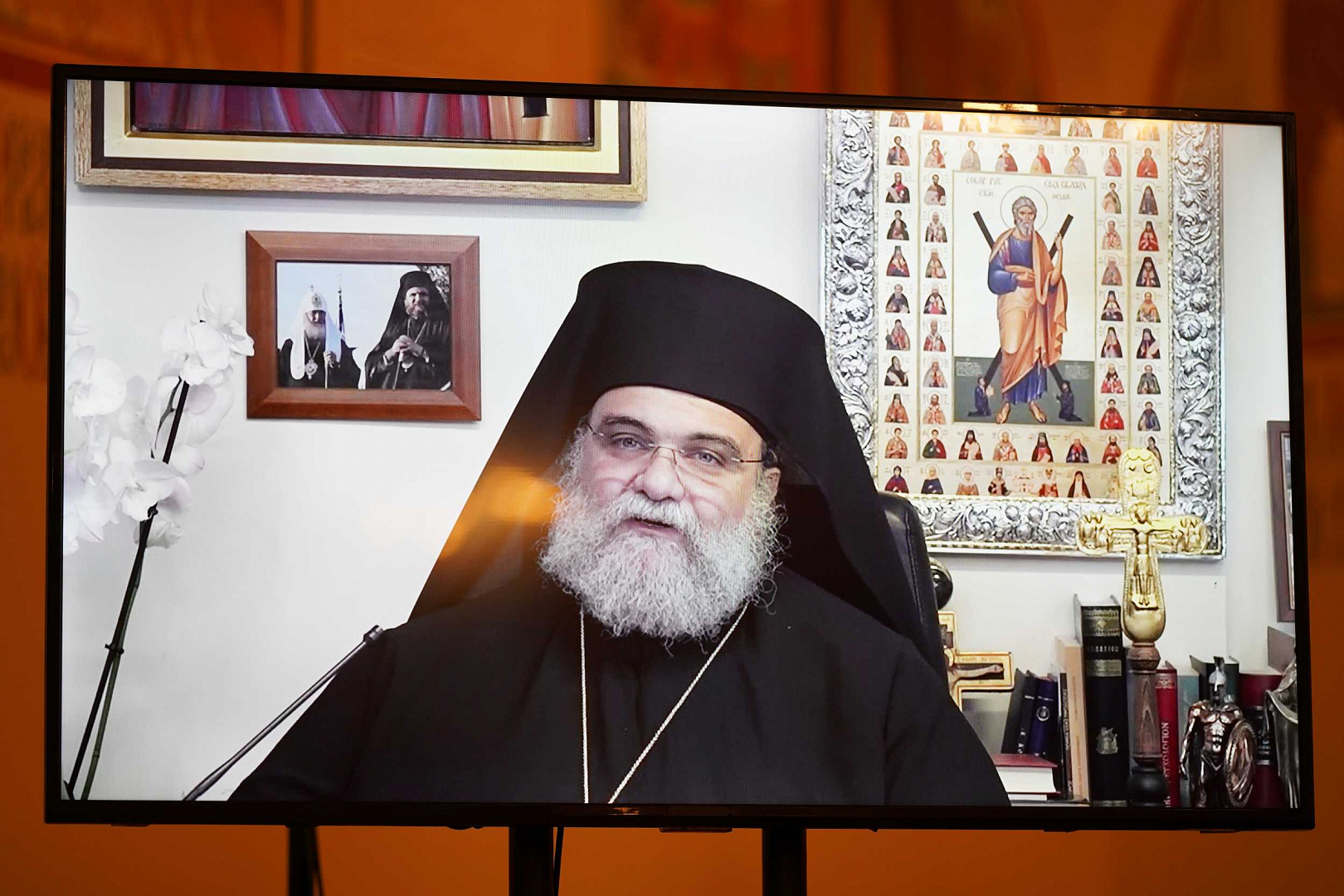
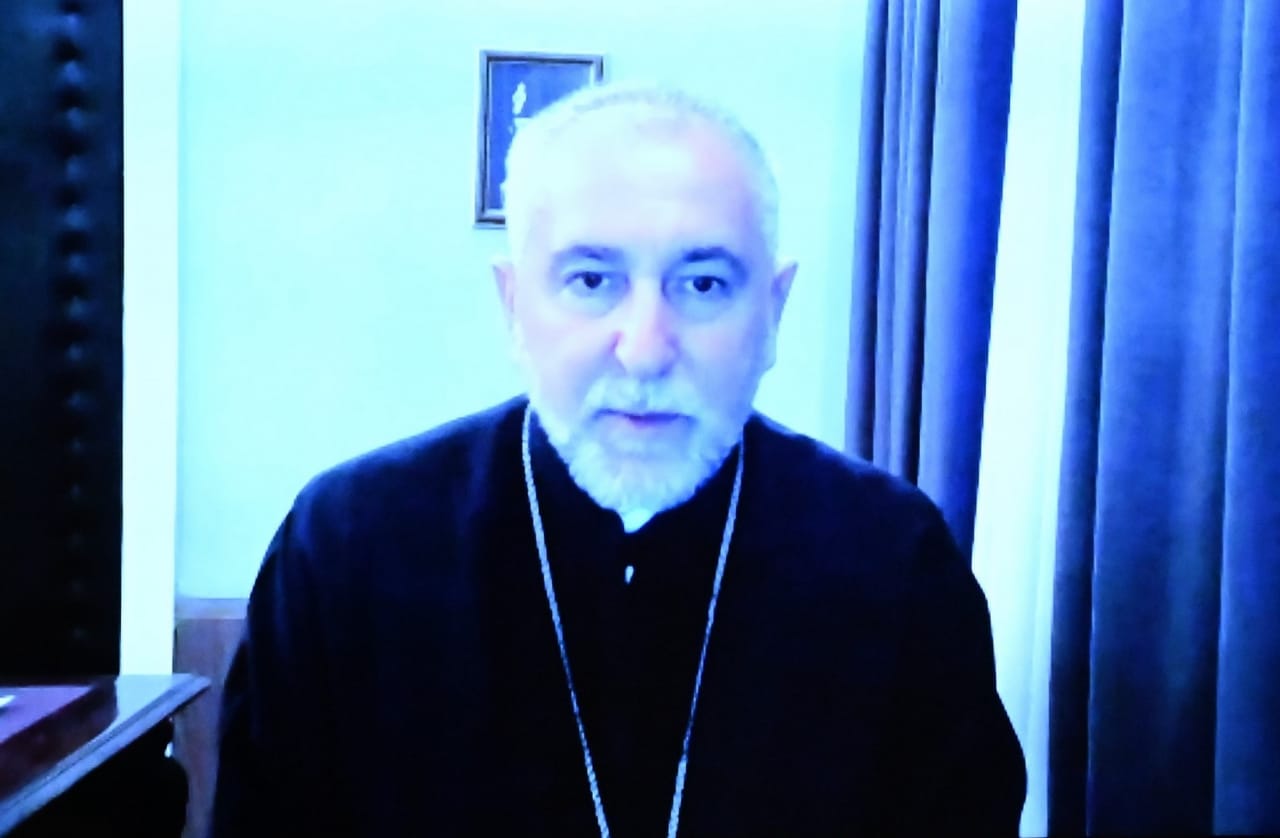
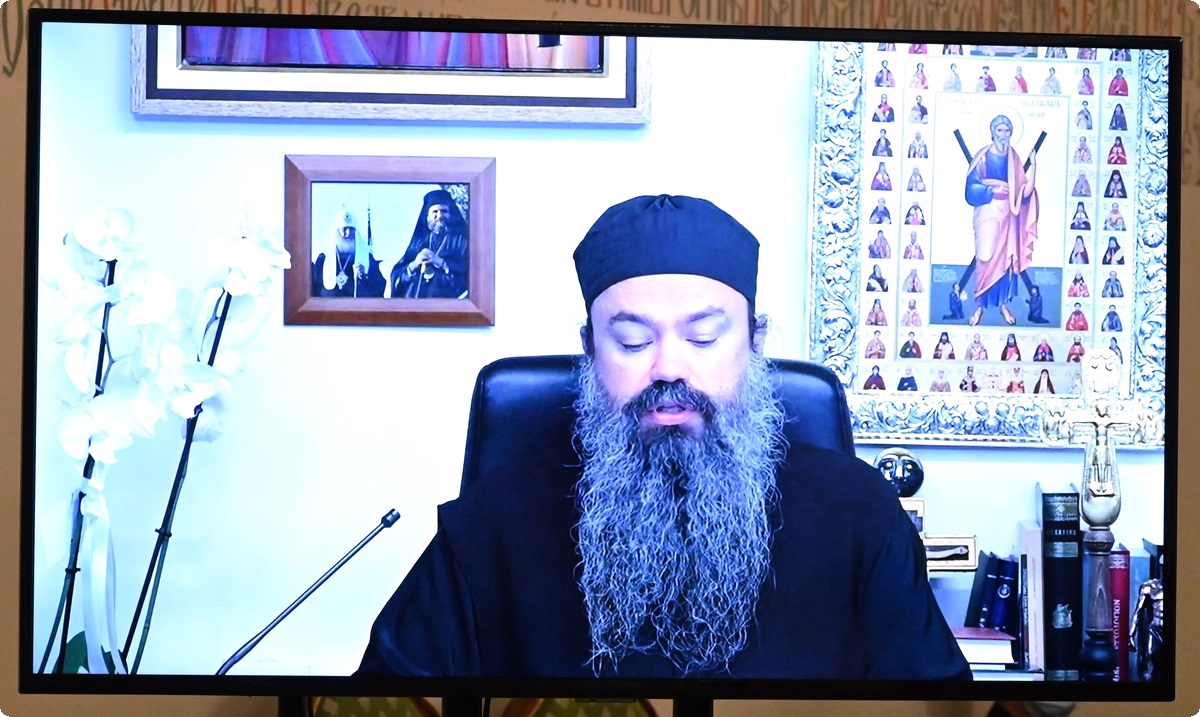

On 16th September 2021 the hierarchs of the Local Orthodox Churches the bishop of Bačka Irinej (Serbian Orthodox Church), the archbishop of Sebaste Theodosius (the Greek Orthodox Church of the Jerusalem Patriarchate), the metropolitan of Gori and Ateni Andrew (Georgian Orthodox Church), the metropolitan of Kykkos and Tillyria Nicephorus (the Greek Orthodox Church of Cyprus) and protopresbyter George Zviadadze (Georgian Orthodox Church) spoke online at the ‘World Orthodoxy: Primacy and Conciliarity in the Light of Orthodox Dogmatic Teaching’ conference. The metropolitan of Tamossos and Oreini Isaiah of the Greek Orthodox Church of Cyprus addressed a word of greetings to the forum participants.
Bishop Irinej fr om the Serbian Church spoke on the topic of ‘Church autocephaly yesterday and today’.
Referring to the granting of autocephalous status by the Patriarch of Constantinople to the Ukrainian schismatics, bishop Irinej emphasized that: “Autocephaly should be the affirmation and strengthening of the conciliarity and unity of the Church, while in actual fact it has become a wall of temptation and a stumbling block. It not only does not serve the cause of strengthening the Orthodox faith and the growth of the body of the Universal Orthodox Church, but above all it does not serve the soteriological goal of the salvation of the souls of the faithful; on the contrary, unfortunately, it is used today as a weapon and means for the destruction of church unity by aiming to redefine Orthodox ecclesiology.”
“The canonical disorder, canonical anarchy, interference and intervention into the canonical territory of the other Local Orthodox Churches has already received a pitiful quasi-theological treatment and justification,” said, in particular, bishop Irinej. “The pastoral aspect and soteriological perspective of the Church’s mission in the world lose their relevance and are even ignored. All of this is happening before our very eyes and is demonstrated in our time by the sad way in which the Patriarchate of Constantinople – our Mother Church - has behaved, unfortunately forgetting what maternal care and love actually mean.”
“It is a very tragic situation, and a dangerous one, but I believe that as on the day of Pentecost, as throughout the entire history of the Church, the Holy Spirit guides the Church. The Saviour assures us that the gates of hell will not prevail over her, they cannot vanquish her, and I am sure a solution of some sort will be found. For if this schism lasts for too long, then, alas, a new schism of the sort we saw in the eleventh century will be inevitable, and guilt will rest upon those who caused this schism. God forbid that this should ever happen and may God grant that in time the situation will be healed,” hopes the Serbian bishop.
Among the speakers at the conference was also the archbishop of Sebaste Theodosius, who expressed his support for the Russian Orthodox Church. He stated that in the Holy Land people are praying unceasingly for the healing of the schism and recognize the only canonical Church in Ukraine, which is the Ukrainian Orthodox Church of the Moscow Patriarchate and her primate His Beatitude Onuphrius, Metropolitan of Kiev and All Ukraine.
In his presentation archbishop Theodosius recalled his joint concelebration with His Beatitude at the Holy Sepulchre in Jerusalem. He was a witness to how “metropolitan Onuphrius raised up his hands and prayed with tears in his eyes for the crisis to cease and for the Lord to bring peace to the Church of Ukraine.” “We are united by love, prayer and hope for the common future of world Orthodoxy,” said archbishop Theodosius.
The metropolitan of Gori and Ateni Andrew offered a short overview of a number of issues in the history of the autocephalous status of the Georgian Orthodox Church. In his presentation metropolitan Andrew particularly spoke of how the first preachers of Christianity in the land of Georgia were the holy apostles Andrew the First-Called and Simon the Canaanite. The mass baptism of Georgians took place in the fourth century thanks to the missionary work of the Equal-to-the-Apostles St. Nina, who is rightly considered to be the Enlightener of Georgia.
The bishop also noted that right up until its independence the Georgian Church was canonically under the Antiochian Orthodox Church, and not the Church of Constantinople. “The period when the ecclesiastical structure came into being in the history of the Georgian Church is linked to both Cappadocia and the Patriarchate of Antioch … If the ecclesiastical trail of the autocephaly of the Georgian Orthodox Church can be traced back to the throne of Antioch, then the political trail, of course, always leads back to Constantinople,” he stated.
Metropolitan Andrew emphasized that Georgia flourished greatly during the reign of King Vakhtang I Gorgaslani of Iberia. In 455 he transferred the capital from Mtskheta to Tbilisi and in the new capital laid the foundations for the famous Zion Cathedral of the Dormition. Under Vakhtang twelve episcopal sees were founded in Georgia.
“From the very beginning of the church crisis on the Ukrainian issue it was quite difficult (for both metropolitan Nicephorus and myself, as well as other Cypriot bishops) to write, speak and pass comment on this topic,” said the metropolitan of Tamossos and Oreini Isaiah in his welcoming address to the conference participants. “You know that geopolitical events have compelled Cyprus to fall in line with Euro-American policy with all the attendant consequences. In spite of this, we are speaking out and writing, and we are also beseeching God to enlighten us to ‘rightly divide the word of truth’ as our episcopal conscience dictates, no matter what the negatives consequences may be for us.”
“I hope that the saints and martyrs of Orthodox Cyprus and Russia will intercede before our Lord Jesus Christ and the Most Holy Mother of God for the unity of the Orthodox Church and the speedy resolution of this grave ecclesiastical problem which should never have arisen,” metropolitan Isaiah said in concluding his video presentation.
The presentation by the metropolitan of Kykkos and Tillyria Nicephorus was read out by video link by archimandrite Seraphim (Gavrikov).
“The ambitions of the Ecumenical Patriarch today extend over the entirety of Ukraine: in essence, he is laying claim to the right to intervene in the internal life of all the Local Orthodox Patriarchates and autocephalous Churches,” the Cypriot bishop remarked in his presentation. At the same time, from the perspective of history and the holy canons on the question of primacy in the Catholic Church there can be only one reply that can be subject to doubt: “Throughout her two-thousand-year history the Orthodox Church has never endowed any of her bishops with the title and powers of Head of the Church.”
“Therefore, it is blindingly obvious – and this can be reasoned historically, canonically and dogmatically from the iconographic tradition and the writings of the fathers – that not a single one of the primates, patriarchs or heads of the autocephalous Churches can occupy the place of the one unchanging Head of the Church, which is our Lord Jesus Christ. The Church in her conciliarity and in her catholicity has no other Head than our Lord Jesus Christ. The supreme canonical authority in the Church is the Ecumenical Councils and not any of the primates of the Local Orthodox Churches. From antiquity onwards people in the Church have believed in the Ecumenical Council as the infallible and supreme institution of the Church and have interpreted it ecclesiologically in this manner,” stated metropolitan Nicephorus.
Protopresbyter George Zviadadze, rector of the Tbilisi Theological Academy and Seminary, devoted his presentation to the question of primacy during the period of the Ecumenical Councils.
“The unity of the Church at the universal level is possible only through the unity of the Local Churches in the eucharistic and ecclesiological contexts,” Father George emphasized. “From the holy eucharist there proceeds not only the oneness of all the Local Churches, but also respect for the ecclesiastical integrity and catholicity of each Local Church. Unity at the universal level, which denigrates the integrity and catholicity of any Local autocephalous Church, contradicts eucharistic ecclesiology. All the perceptions of the primacy of the holy apostle Peter, which are viewed as the primacy of the power of papal rule, destroy eucharistic ecclesiology, which is alien and unacceptable to the Orthodox tradition.”
The presentation noted that the apostolic canons and the canons of the Ecumenical Councils do not allow for the autocracy of the first bishop and even more so for absolutism in the Church: “The supreme court for the resolution of religious and canonical issues is the Council of bishops, either Local, of if so required, Ecumenical. The synodal principle presupposes that the supreme organs of administration in the Orthodox Church do not have an autocratic nature, and this has been laid down by the First and Second Ecumenical Councils.
The Local autocephalous Church exercises her right to administration in an entirely independent manner. The norms of canon law strictly define the principle of autocephaly – this principle has been observed since apostolic times: from the first to the third centuries all bishops within the confines of their dioceses were independent. The situation changed at the beginning of the fourth century when within the confines of the provinces of the Roman empire there appeared at first metropolitanates, while by the sixth century there were formed patriarchates, the foundation of which did not presuppose a lim it to the number of autocephalous Churches to five … In the commentaries of the Byzantine canonist the Patriarch of Antioch Theodore Balsamon to the 2nd canon of the Second Ecumenical Council it is made evident that there also existed beyond the confines of the Roman empire autocephalous Churches, among which were the Churches of Bulgaria, Cyprus and Iberia (i.e. Georgia),” the speaker noted.
“In ecclesiastical and canonical practice, it would be quite wrong for there to exist an administration centre at a universal level which would have the powers of administration,” said Father George Zviadadze in conclusion.
Presentations were also given by representatives of the Ukrainian Orthodox Church of the Moscow Patriarchate.
Thus, the bishop of Bilohorodka Sylvester, rector of the Kiev theological schools, presented a talk on the topic of the doctrine of the primacy of the Patriarch of Constantinople as reflected in the normative documents of the Orthodox Church of Ukraine (OCU). In his speech, bishop Sylvester noted that ecclesiastical events that have occurred in Ukraine over the past few years have turned out to be a testing time for all of world Orthodoxy. The publication of the Tome of Autocephaly for the schismatic OCU has led not only to a “profound crisis in the mutual relations between the Local Orthodox Churches, but have also made relevant the issue of primacy in the Universal Church.”
The speaker noted that Patriarch Bartholomew “has consistently used the Ukrainian church situation to declare his special status among the Local Orthodox Churches.” “According to the Statutes of the OCU, the authority of the Patriarch of Constantinople extends beyond the Church of Constantinople and has a universal character. This places the Patriarchal Throne of Constantinople above all the other Local Churches … Patriarch Bartholomew in his speech on the church situation in Ukraine consistently underscored his special status in world Orthodoxy. It is quite evident that the Patriarch of Constantinople is attempting to use the Ukrainian situation in order to strengthen his own position in world Orthodoxy, and so it comes as no surprise that in the documents of the OCU this doctrine is formulated in no ambiguous terms,” said bishop Sylvester.
“The Patriarch of Constantinople is appropriating for himself the exclusive right to issue Tomes of Autocephaly for the Local Orthodox Churches and to receive appeals from clerics of all the Local Churches on the decisions of ecclesiastical courts and to exercise spiritual guidance over the Orthodox diaspora … The Russian Orthodox Church altogether rejects this understanding of primacy in the Universal Church,” the bishop emphasized.
“The church conflict in Ukraine to a significant degree is rooted in those deep contradictions which have accumulated in the mutual relations between the Local Churches. It is quite evident that the Patriarch of Constantinople is attempting to use the Ukrainian situation to further his position in world Orthodoxy and to push through the doctrine of his primacy in the Universal Church,” stated bishop Sylvester.
“A canonical collision caused by the Patriarchate of Constantinople interfering in the affairs of the Ukrainian Orthodox Church,” is the title of the presentation given by the metropolitan of Bila Tserkva and Bohuslav Augustine, chairman of the theological and canonical commission under the Holy Synod of the Ukrainian Orthodox Church.;
“The de facto recognition by the Patriarch of Constantinople of the schismatic ‘hierarchy’ consisting of persons ordained by schismatic bishops and excommunicated from the Church, and who have been sanctioned and anathematized by the Episcopal Councils of both the Ukrainian and Russian Orthodox Church, is an open challenge to all the Local Orthodox Churches,” stated metropolitan Anthony. He believes that the problem needs to be judged from both the perspective of pastoral theology and ethical morality, as it has an effect on the pastoral practice of the Church. “The generally high religious nature of the Ukrainian people combined with ignorance or even incompetence in the area of dogmatic teaching – and both woven artificially into the political context – have created on the ground a situation whereby differences have been completely wiped out and there has arisen a total lack of an awareness of the situation among the majority of people,” said the bishop of the Ukrainian Orthodox Church. “On the everyday level of the church agenda there remain open and unresolved the issues of recognizing the sacraments of baptism, chrismation, marriage and priestly ordinations performed by schismatics excommunicated from the Church, as well as the use of the holy chrism by clergy of the Patriarchate of Constantinople in America long before the current events.”
“With the passing of time, when the transient social and politically orientated priorities of legitimacy and handshakes have faded into obscurity, the only things that will be of importance for Universal Orthodoxy will be the issues and values that transcend these categories. And both before God and the history of the Church those who will bear responsibility are all those who were party to these historical events and their consequences – from the initiators to those who created the media furor against all of this,” metropolitan Anthony said in conclusion.
The organizers and partners of the forum, which will continue on 17th September, are the Synodal Bible-Theological Commission, the Department for External Church Relations of the Moscow Patriarchate and the Ss. Cyril and Methodius Theological Institute for Post-Graduate Studies. The event has been funded by the Foundation for the Support of Christian Culture and Heritage.
